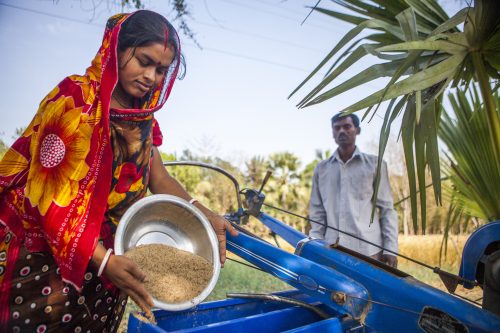Overcoming gender gaps in rural mechanization
 The custom hiring of labor- and cost-saving agricultural machinery services is increasingly common in South Asia. With agricultural machinery, gender gaps exist not only in the use of these technologies, but in farmers’ ability to rent and hire them.
The custom hiring of labor- and cost-saving agricultural machinery services is increasingly common in South Asia. With agricultural machinery, gender gaps exist not only in the use of these technologies, but in farmers’ ability to rent and hire them.
To explore gender dynamics in emerging markets for agricultural machinery service-provision in Bangladesh, the Gender, Climate Change, and Nutrition Integration Initiative (led by IFPRI), CSISA and CSISA-MI partnered to conduct qualitative research in Faridpur and Jhenaidah districts in October–December 2017. The team interviewed husband and wife machine service providers, men and women who hire machines for their farms, women farmers in non-mechanized farming households, and CSISA staff and community leaders.
Researchers focused on machinery services for multi-crop reaper-harvesters, which enable farmers to rapidly cut crops during harvest. Service providers running reaper businesses often hire skilled machine operators to harvest farmers’ fields. Women and men in the study identified multiple benefits of hiring reaper services, including the reduction of drudgery, the ability to pay for services after receiving them (unlike when they hire laborers, whom they have to pay up front), the time saved during crop harvesting, and the cost savings associated with using a machine rather than laborers who need to be housed and fed.
Unfortunately, women were found to face multiple barriers to running reaper-based service provider businesses, including: cultural norms preventing them learning about machines from men, lack of capital for investing in machines, fewer connections to help them advertise machine services, an unwillingness among men to operate machines for women, and a lack of family and community support for women who want to work outside the home.
Despite these gender-based constraints, many women still expressed interest in participating more or starting their own reaper service provision business. The following approaches can help close gender gaps in reaper-based business ownership: models that allow joint machine ownership and provide training to men and women equally; leveraging women’s networks to expand their potential client bases; well-targeted, smart subsidies that make machine procurement more accessible for women; encouraging savings and loan associations to provide credit to women; models of group-based machine ownership; mobile phone-based payment options for clients; and sensitizing men to women’s contributions to service provision businesses.
Clearly, women benefit from managing and sometimes owning machinery services, as well as from the direct and indirect consequences of hiring such services to harvest their crops. However, a number of technical, economic, and cultural barriers still constrain women’s full participation in these benefits. Initiatives that promote rural machinery services should more fully engage women as business owners and users of machinery to expand the benefits of these markets throughout South Asia and other farming geographies dominated by smallholders.